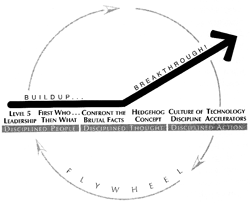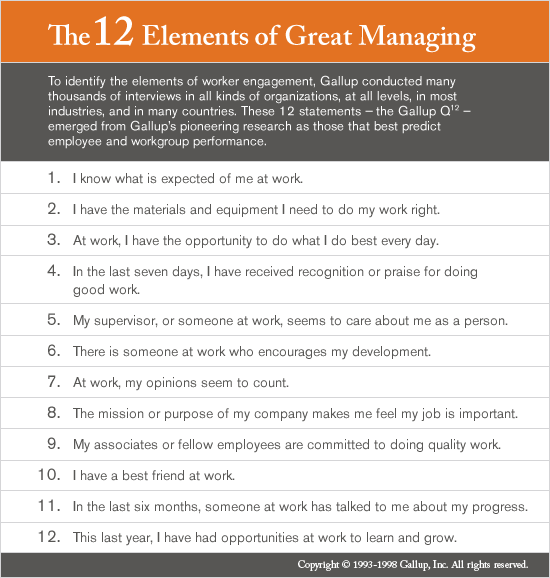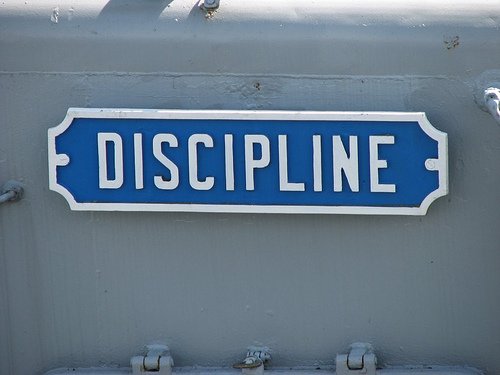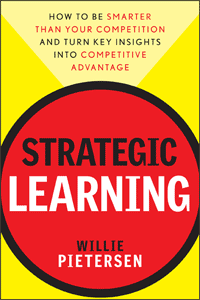Good is the enemy of great. That’s the first chapter of Good to Great. So what’s the problem with being good? Nothing. Except it limits us. Except that it means we are vulnerable to others that decide to be great. Except that it means we are okay with mediocre. Do you want to be okay with being mediocre, or simply just good? I don’t.
Strategic Discipline Blog
Good is the Enemy of Great: Failed Strategic Discipline
Posted by Douglas A Wick on Thu, Sep 23, 2010
Topics: Good to Great, Strategic Discipline, Jim Collins
A recent article from Gallup Management Journal on What Really Drives Financial Success? reminded me how valuable the book First Break All the Rules is for determining strength in the workplace. If you employ five or more employees I strongly recommend you pick up the book or its more recent version 12: The Elements of Great Managing. It reveals the following 12 rules as being critical to having a well engaged and performing workplace:
Topics: Good to Great, employee engagement, Strategic Discipline, Pearsons Law, Q12, First Break All the Rules
Routine Sets You Free – Setting the Course for Strategic Discipline
Posted by Douglas A Wick on Fri, Sep 3, 2010
Routines are boring. One question I’m often asked is why do clients quit doing the Rockefeller Habits if they’re so successful? The answer is the repetitive nature of routine. Habits become mundane. We all love the feeling of independence. We yearn for the freedom to do whatever we want. Yet in business without the right habits we fail to achieve. You can tell the strength of a business and its leader by the strength of their routines.
Topics: Strategic Discipline, meeting rhythms, goals
Why do most businesses fail? It’s natural to assume most businesses fail due to poor execution. The answer may surprise you.
Topics: Strategic Discipline, meeting rhythms, priorities, metrics, Strategic Learning, Execution
This week I spent about 16-20 intense hours working with a client’s executive team developing their strategic focus through Gazelles Two Day Rockefeller Habits Workshop. In Willie Pietersen’s book Strategic Learning he indicates that focus and compounding are the two most powerful forces in the universe. Developing clarity of focus is your springboard. Albert Einstein called compound interest the most powerful force in the universe. [Compounding is reinvesting the income on an investment and watching your principle grow. It grows exponentially over time. See Chart below.]
Topics: Strategic Discipline, One Thing, priorities, Focus, Strategic Planning, Compounding
Strategic Discipline’s Approach to Five Killer Competencies
Posted by Douglas A Wick on Fri, Aug 13, 2010
Topics: Strategic Discipline, meeting rhythms, One Page Strategic Plan, priorities, Strategic Planning, Five Killer Competencies
A fundamental principal of Gazelles coaching is learning plus coaching equals growth. The book Strategic Learning, by Willie Pietersen confirms and reinforces these principals. The author points out that the key is to focus learning to shift from strategy as planning to strategy as learning, and thus to the new mission of strategy: to create an adaptive enterprise.
Topics: Strategic Discipline, Aubrey Daniels, Strategic Learning, VUCA, Five Killer Competencies
The Pace of Change is requiring you and your staff to maintain a constant awareness of the marketplace. It is necessary to have your antennae attuned to every opportunity.
Topics: Strategic Discipline, meeting rhythms, pattern recognition, Pace of Change
I read several books while on vacation including one recommended by one of our Gazelles coaches, Strategic Learning, by Willie Pietersen. I’m sure you’ve noticed how frantically the environment is changing. One of my clients today when reviewing his preparatory work for our Two Day Rockefeller Workshop noted one of his greatest fears is keeping pace with the rapid changes in technology that influence his business. He’s afraid some pimple faced kid in a garage may come up with a tool that will render his company obsolete.
Topics: Strategic Discipline, meeting rhythms, priorities, metrics, Strategic Learning, Pace of Change
Success Path – Strategic Discipline, Commitment & Vision
Posted by Douglas A Wick on Wed, Jul 14, 2010
Success is a difficult path to navigate based on exceptionally few numbers of businesses' that achieve success. A recent challenge with one of my clients helps me recognize that success isn’t so much the greatness or talent of the person; rather it’s the commitment they make to strategic discipline and maintaining a vise-like grip on their vision.
Topics: Strategic Discipline, small business, Jim Collins















.jpeg?width=150&height=135&name=Hand%20with%20marker%20writing%20the%20question%20Whats%20Next_%20(1).jpeg)

